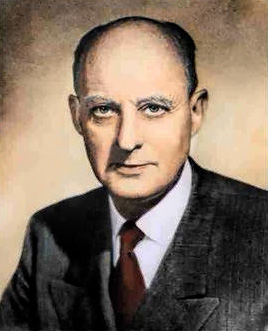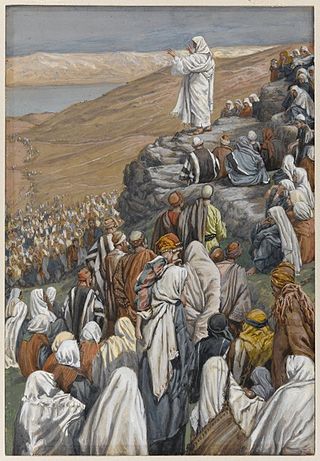Theology is the study of religious belief from a religious perspective. More narrowly it is the study of the nature of the divine. It is taught as an academic discipline, typically in universities and seminaries. It occupies itself with the unique content of analyzing the supernatural, but also deals with religious epistemology, asks and seeks to answer the question of revelation. Revelation pertains to the acceptance of God, gods, or deities, as not only transcendent or above the natural world, but also willing and able to interact with the natural world and to reveal themselves to humankind.

Karl Paul Reinhold Niebuhr (1892–1971) was an American Reformed theologian, ethicist, commentator on politics and public affairs, and professor at Union Theological Seminary for more than 30 years. Niebuhr was one of America's leading public intellectuals for several decades of the 20th century and received the Presidential Medal of Freedom in 1964. A public theologian, he wrote and spoke frequently about the intersection of religion, politics, and public policy, with his most influential books including Moral Man and Immoral Society and The Nature and Destiny of Man.
The Christian left is a range of Christian political and social movements that largely embrace social justice principles and uphold a social doctrine or social gospel based on their interpretation of the teachings of Christianity. Given the inherent diversity in international political thought, the term Christian left can have different meanings and applications in different countries. While there is much overlap, the Christian left is distinct from liberal Christianity, meaning not all Christian leftists are liberal Christians and vice versa.

Nicholas Paul Wolterstorff is an American philosopher and theologian. He is currently Noah Porter Professor Emeritus of Philosophical Theology at Yale University. A prolific writer with wide-ranging philosophical and theological interests, he has written books on aesthetics, epistemology, political philosophy, philosophy of religion, metaphysics, and philosophy of education. In Faith and Rationality, Wolterstorff, Alvin Plantinga, and William Alston developed and expanded upon a view of religious epistemology that has come to be known as Reformed epistemology. He also helped to establish the journal Faith and Philosophy and the Society of Christian Philosophers.

Stanley Martin Hauerwas is an American theologian, ethicist, and public intellectual. Hauerwas originally taught at the University of Notre Dame before moving to Duke University. Hauerwas was a longtime professor at Duke, serving as the Gilbert T. Rowe Professor of Theological Ethics at Duke Divinity School with a joint appointment at the Duke University School of Law. In the fall of 2014, he also assumed a chair in theological ethics at the University of Aberdeen. Hauerwas is considered by many to be one of the world's most influential living theologians and was named "America's Best Theologian" by Time magazine in 2001. He was also the first American theologian to deliver the prestigious Gifford Lectures at the University of St. Andrews in Scotland in over forty years. His work is frequently read and debated by scholars in fields outside of religion or ethics, such as political philosophy, sociology, history, and literary theory. Hauerwas has achieved notability outside of academia as a public intellectual, even appearing on The Oprah Winfrey Show.

John Boswell Cobb Jr. is an American theologian, philosopher, and environmentalist. He is often regarded as the preeminent scholar in the field of process philosophy and process theology, the school of thought associated with the philosophy of Alfred North Whitehead. Cobb is the author of more than fifty books. In 2014, Cobb was elected to the prestigious American Academy of Arts and Sciences.

David Novak, is a Jewish theologian, ethicist, and scholar of Jewish philosophy and law (Halakha). He is an ordained Conservative rabbi and holds the J. Richard and Dorothy Shiff Chair of Jewish Studies as Professor of the Study of Religion and Professor of Philosophy at the University of Toronto since 1997. His areas of interest are Jewish theology, Jewish ethics and biomedical ethics, political theory, and Jewish-Christian relations.

Christian ethics, also known as moral theology, is a multi-faceted ethical system. It is a virtue ethic, which focuses on building moral character, and a deontological ethic which emphasizes duty. It also incorporates natural law ethics, which is built on the belief that it is the very nature of humans – created in the image of God and capable of morality, cooperation, rationality, discernment and so on – that informs how life should be lived, and that awareness of sin does not require special revelation. Other aspects of Christian ethics, represented by movements such as the social Gospel and liberation theology, may be combined into a fourth area sometimes called prophetic ethics.

Mohammad Mojtahed Shabestari is an Iranian philosopher, theologian, hermeneutist and former professor at University of Tehran. He is noted for his idea that "religion-in-itself" is perfect, but not all-encompassing, i.e. it does not possess the answer to every question in life. Formerly a political activist and MP, he retired himself from politics in 1984.
The University of Chicago Divinity School is a private graduate institution at the University of Chicago dedicated to the training of academics and clergy across religious boundaries. Formed under Baptist auspices, the school today lacks any sectarian affiliations.
Max Lynn Stackhouse was the Rimmer and Ruth de Vries Professor of Reformed Theology and Public Life Emeritus at Princeton Theological Seminary. He was ordained in the United Church of Christ and was the president of the Berkshire Institute for Theology and the Arts.
Political theology is a term which has been used in discussion of the ways in which theological concepts or ways of thinking relate to politics. The term is often used to denote religious thought about political principled questions. Scholars such as Carl Schmitt, a prominent Nazi jurist and political theorist, who wrote extensively on how to effectively wield political power, used it to denote religious concepts that were secularized and thus became key political concepts. It has often been affiliated with Christianity, but since the 21st century, it has more recently been discussed with relation to other religions.

Gary John Dorrien is an American social ethicist and theologian. He is the Reinhold Niebuhr Professor of Social Ethics at Union Theological Seminary in the City of New York and Professor of Religion at Columbia University, both in New York City, and the author of 18 books on ethics, social theory, philosophy, theology, politics, and intellectual history.
Religious liberalism is a conception of religion which emphasizes personal and group liberty and rationality. It is an attitude towards one's own religion which contrasts with a traditionalist or orthodox approach, and it is directly opposed by trends of religious fundamentalism. It is related to religious liberty, which is the tolerance of different religious beliefs and practices, but not all promoters of religious liberty are in favor of religious liberalism, and vice versa.
Rev. David Hollenbach, S.J. is a Jesuit priest, professor, author, and moral theologian currently serving as the Pedro Arrupe Distinguished Research Professor of the Walsh School of Foreign Service at Georgetown University. He is a consultant to the Jesuit Refugee Service and is the recipient of the John Courtney Murray Award from the Catholic Theological Society of America in 1998.

William Schweiker is an American theological ethicist. He is the Edward L. Ryerson Distinguished Service Professor of Theological Ethics at the University of Chicago. His research focuses on globalization as an ethical problem, hermeneutic philosophy, theological humanism, the history of ethics, and comparative religious ethics.
Dennis P. McCann is the Wallace M. Alston Professor of Bible and Religion at Agnes Scott College in Atlanta/Decatur, Georgia, where he teaches in the fields of religious social ethics, comparative religious ethics, philosophy of religion, and Catholic studies. Before his tenure at Agnes Scott College beginning in 1999, McCann was Professor of Religious Studies at DePaul University in Chicago. In 1992 he was named the first annual holder of the Wicklander Chair in Business and Professional Ethics at DePaul University.
William T. Cavanaugh is an American Catholic theologian known for his work in political theology and Christian ethics.
Mark Douglas is a professor of Christian ethics at Columbia Theological Seminary and he is known for his work on religious language in the public sphere, medical and business ethics, the American philosophical tradition of pragmatism, the environment, just war and pacifism, and the role of religion in political philosophy.
Luke Bretherton is a British author and theologian. His work addresses contemporary moral and political questions, particularly as these relate to the relationship between religion and democracy. He is currently Robert E. Cushman Distinguished Professor of Moral and Political Theology at Duke University in North Carolina (2012–present). Previously he taught at King’s College London (2004-2012) and St Augustine’s College (2001-2004). Alongside his scholarly work, he writes in the media on topics related to religion and politics, has worked with a variety of faith-based NGOs and churches around the world, and is actively involved in forms of grassroots democratic politics, both in the UK and the US. He hosts and writes the Listen, Organize, Act! Podcast.








